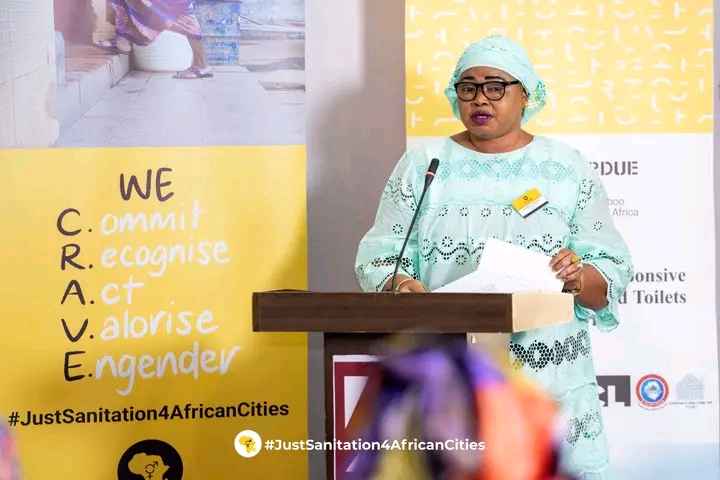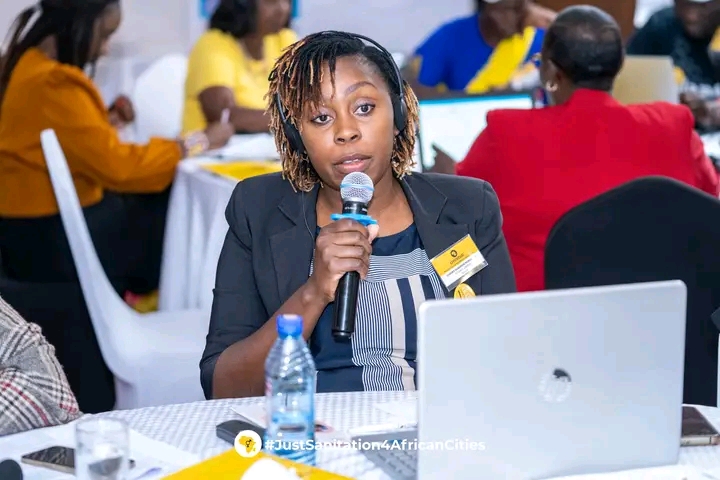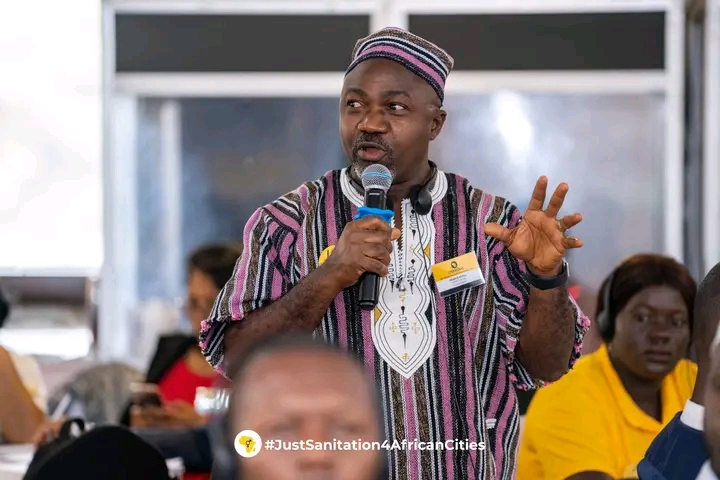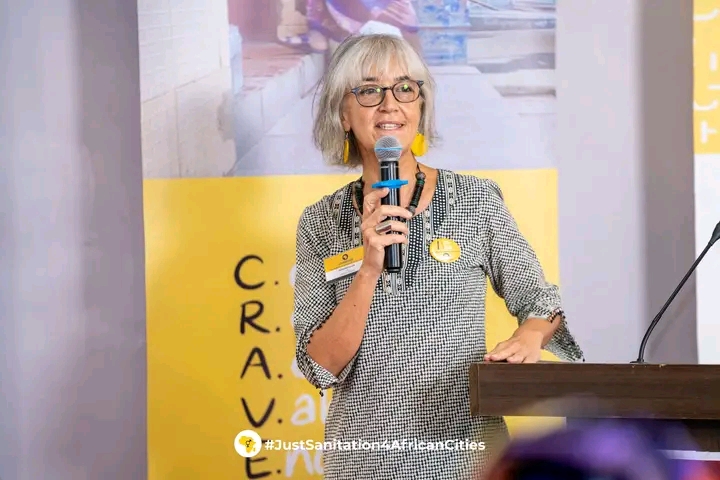In a welcome Call For Action executed at OVERDUE’s regional meeting held at the Ngong Hills Hotel in Nairobi, Kenya, on September 11&12 2023, various stakeholders and partners in the cause for acceptable standards of sanitation in Africa’s urban areas shared findings, exchanged ideas, and explored feasible solutions.
The forum which featured discussions on sanitation through the lenses of Gender, Climate Change, Sexual and Gender Based Violence (SGBV) and Economic Empowerment saw public and private sector representatives from over 21 African cities converge in Nairobi.
“We are very glad as UN-Habitat to be associated with this campaign and also the call to action. We have a very long history of engagement with African Cities started in 1999” remarked Mr. Pireh Otieno Hezekiah, UN-Habitat Water & Sanitation Team Leader, whose presentation emphasised the pivotal importance of sanitation as an inalienable human right. His presentation underscored the urgency of ensuring that every individual has access to dignified sanitation facilities, positioning it as a fundamental right.
“This issue is not just overdue, it’s also unacceptable, and this is something that UN-Habitat takes very seriously.” asserted Mr. Otieno
His powerful statement resonated with the audience, driving home the message that the current state of sanitation demands immediate attention and action.
The OVERDUE forum was an intellectually charged and action-oriented event that delved into critical aspects of just sanitation. A dynamic introduction facilitated by Development Planning and Urban Sustainability Professor Adriana Allen who’s also the President of Habitat International Coalition (HIC), and Prof Wilbard Kombe of Ardhi University (ARU), Institute of Human Settlements Studies in Dar es Salaam, Tanzania, set the stage for an engaging discourse. The objectives and precedents for the discussions were meticulously outlined under the guidance of Adriana Allen.
“As we convene in Nairobi for the long-awaited overdue sanitation conference, it is imperative to bear in mind that sanitation goes beyond being a mere basic necessity: it is an intrinsic human right that lies at the core of our well-being. The concept is remarkably straightforward – we all require shelter over our heads, nourishment on our tables, access to clean and safe drinking water, and a dignified place to heed nature’s call.” explained Ms. Allen

Photo credit: Collines Communications
Hon. Rohey Malick Lowe, Lord Mayor of the City of Banjul, The Gambia, and President of the Network of Local Women Elected in Africa (REFELA), provided a compelling discourse on gender equality within the context of sanitation.
“At the heart of our discussions in Nairobi is the recognition that women aren’t just users; they are the unsung heroes, the producers of sanitation. It’s because of their tireless efforts that the critical lifeline of sanitation is maintained, yet they remain largely unpaid for this essential work.” Hon. Lowe said
Her presentation was a rallying call for empowering women and actively involving them in sanitation initiatives across the African continent. According to a report on gender, community development & civil society published by the “East African Community”, women, despite constituting over 60 percent of the EAC population are still marginalised in the decision-making processes.
“Let’s change that narrative! Let’s celebrate and empower the women who keep our communities clean and healthy.” emphasised Ms. Lowe
The level of exposure to illness causing germs subjected to slum dwellers in Africa as a result of poor sanitation and lack of access to clean water is a major concern. Although the situation has improved over the decades, the change has been slight and slow with findings indicating that in most cases safe water remains unaffordable for slum dwellers.
In a call for inclusive urbanisation, various speakers at the Just Sanitation For African Cities forum captivated the audience with insights into how social movements are and should actively contribute to inclusive urbanisation.
Diana Wachira, a passionate advocate from Habitat International, shed light on the importance of viewing sanitation through the lens of tenancy and rent.
“In informal settlements, tenants hold complex rights that determine their access to land and the quality of their living conditions. The more you pay, the better services you gain. We must strive for equitable access to sanitation, regardless of one’s circumstances.” she said
Her sentiments were echoed by Joe Muturi, President of Slum Dwellers International (SDI), who highlighted the indispensable role of communities and grassroots organisations in advocating for improved sanitation conditions in urban areas.

Photo credit: Collines Communications
These enlightening presentations set the stage for deep deliberations on specific steps aimed at fostering just sanitation.
Contributions by Hon. Milka Moraa Areba, President of the Women Caucus of COG’s REFELA in Mombasa, Kenya, and Lawrence Apiyo, Director of Grassroots Trust for Community Organization in Nairobi, Kenya, expounded on the pivotal role of localised efforts in driving positive change in sanitation, while Francis Reffell, Director of CODOHSAPA in Free Town, Sierra Leone, and Oluwatoyin Towobola, Director of Women Protection Organisation at HIC in Lagos, Nigeria, delved into the imperative of ensuring equitable access to sanitation services and community control over them. Wilbard Kombe of ARU, and Sam Olando Executive Director of Pamoja Trust in Nairobi, on their part engaged in a thought-provoking dialogue regarding various forms of land tenure and their profound impact on sanitation access.
This intellectual discourse which culminated in a plenary discussion that allowed for a synthesis of ideas and perspectives was further enriched by the closing remarks provided by Ann Wanjiru from Huaroui Commission, Nairobi and Hon. Badou Harlette N’Guessan Nee Kouame REFELA, Mayor of Arrah, Ivory Coast saw the contributions consolidated to form Building Block A of the Call To Action.
Building Block B was dedicated to amplifying the voices that often remain marginalised in sanitation discourse whereby Coordinator of Saint Louis Gender and Development Observatory (OGDS) Senegal Penda Diouf, and Violet Shivutse the President of Huairou Commission, Kisumu, Kenya, illuminated the multifaceted role of gender equality across all facets of the sanitation process.
Their presentations highlighted the need for gender parity and leadership at every level of sanitation planning and implementation.
Subsequently Liliane Rajaobelimahefa of SIMIRALENTA in Antananarivo, Madagascar and Chaiwe Sanderse of SuSaNa, Lusaka, Zambia, elucidated the critical issue of improving working conditions for sanitation workers, both paid and unpaid with their discussions emphasising the importance of dignity and respect in this sector. Coordinator of the Congolese Women’s Union for Households Balance / Gender in Action (CFCEM/GeA) Bukavu, Democratic Republic of Congo Astrid Mujinga and Pascal Kipkemboi and Teresia Wanjiru Nduta of Kounkuey Design Initiative (KDI) Nairobi, Kenya also weighed in.
Championing the cause of inclusivity in sanitation planning and implementation, they touched on the significance of considering the diverse needs and experiences of communities in sanitation projects.
A thought-provoking plenary discussion following the presentations on Building Block B fostered a collective understanding of the issues at hand.

Photo credit: Collines Communications https://collinescommunications.com/
Two more building blocks were adopted. Block C focused on “Channeling Resources in a Fair Way” and attendants were at hand with well thought out and articulated points which included input by; Angèle Koué, Director of Gender Parity Female Leadership (GEPALEF) Abidjan, Ivory Coast; Diana Wachira, Learning Officer Habitat International Coalition (HIC), Nairobi, Kenya; Tim Ndezi, Director Center for Community Initiatives (CCI), Dar es Salaam, Tanzania; Gertrude Salano of Water & Sanitation for the Urban Poor (WSUP), Nairobi, Kenya; Daniel Mukeba of ISECOF/CFECM, Bukavu, DRC; Abdul Marah, Development and Planning Director, Freetown City Council, Sierra Leone; Mary Lubelwa, President Mwanza Federation of the Urban Poor; Hon. Maria Helena Langa, REFELA, Mayor of Mandlakazi, Mozambique.
The speakers surgically expounded on the importance of democratic decision-making processes, networked off-grid sanitation systems, continuous learning and monitoring in sanitation projects, redistribution of resources across the sanitation chain, inclusive and diverse financing mechanisms.
A plenary discussion centered on the key points raised by the speakers followed soon after with participants actively engaging in dialogue and sharing their insights on the themes of democratic decision-making, networked sanitation systems, resource redistribution, and financing mechanisms.
More speakers went ahead to dissect Building Block D which revolves around “Building Caring and Healthy Cities”. This session moderated by Pascale Hofmann (DPU) saw Hélder Domingos, Director FACE, Beira, Mozambique; Funmi Adeniyi, ICLEI Abuja, Nigeria; Moisés Chenene, SASB Director, Beira, Mozambique; Stanislas Kamengele, Director Femmes Rurales Amies de la Paix et du Développement (DRC) / HIC, Kinshasa, DRC; Soukeyna Diouf, OGDS, Saint Louis, Senegal; Hyacinthe Kouakou, Director Institut d’Economie Circulaire, Abidjan, Ivory Coast; Mamadou Sylla, Deputy Director of Studies and Regulations, Deputy Head of Sanitation, Ministry of Water, Sanitation, and Hygiene, Ivory Coast; Hon. Marie Angèle Meyanga èpse Noah, Mayor of Afanloum, Cameroon (REFELA).
The subsequent plenary discussion allowed participants to engage in a lively discussion where they exchanged ideas and experiences related to the key points raised in the Building Block D speakers’ contributions on climate action, health outcomes, and circular systems in sanitation projects.
Further discourse saw participants collaborate to refine the conference findings and recommendations, as they shared more insights geared towards ensuring development of commitments which showcased the collective dedication of all participants to creating a more equitable and sustainable sanitation future for communities worldwide.

Photo credit: Collines Communications
Participants from various sectors gathered to address these critical issues, emphasising the interconnectedness of sanitation with broader concerns such as climate change, land tenure, off-grid sanitation, and gender rights.
Oyo Razakamahefa, Sanitation Director Ministry of Water, Sanitation, and Hygiene, Antananarivo, Madagascar highlighted the importance of the discussions and urged participants to carry forward the momentum in their respective regions. He emphasised the need for international collaboration in achieving the goals set during the conference.
Hon. Aida Mbaye, Deputy Mayor of Saint Louis expressed gratitude for the productive discussions and highlighted the commitment of Saint Louis to implement the outcomes of the conference, while Mr. Sylla emphasised the need for integrating sanitation into broader development agendas and lauded the collaborative efforts showcased during the conference, and Mayor Noah expressed her commitment to implementing the conference outcomes in Afanloum and encouraged other municipalities to do the same.
The conference was marked by a recognition of the complex challenges facing sanitation in African cities with the discussions providing holistic understanding of sanitation’s interconnectedness with other key aspects of societal well-being. The commitment to addressing these challenges collectively was evident, leading to a promising conclusion adorned with preliminary endorsements of the call to action, and participants agreed on the next steps to ensure the implementation.
Follow the #JustSanitation4AfricanCities journey via OVERDUE social media accounts like Facebook @ https://www.facebook.com/overdue.justsanitation?mibextid=ZbWKwL